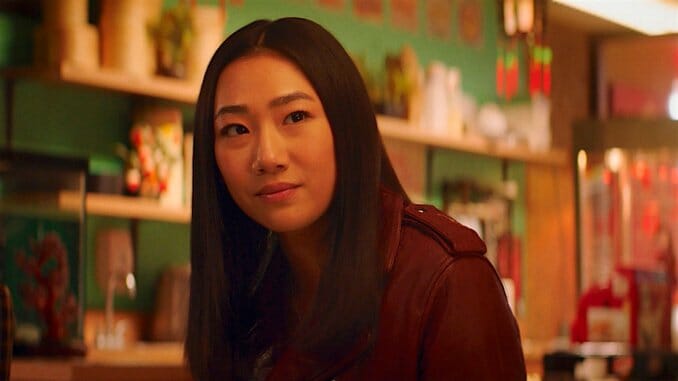Kung Fu Star Olivia Liang on Updating a Classic, Reflecting the Asian American Experience, and Mythical Fun
Photo Courtesy of The CW
Before actress Olivia Liang landed the starring role in The CW’s reboot of the ‘70s cult martial arts drama Kung Fu, she spent two seasons at Salvatore’s Boarding School for the Young & Gifted on Legacies. As troubled young witch Alyssa Chang, Liang was put through her paces, surrounded by an ensemble of her fellow eager young actors, all learning the ropes of the hour-long, TV-making grind.
What Liang didn’t know at the time was that experience was also preparing her to be Number One on the call sheet for her own series, which would happen far quicker than expected. “They just really taught me so much about leading a set,” Liang tells Paste about her experiences via a phone call from Vancouver. “Danielle (Rose Russell) lead the show and she’s was so gracious and so respectful and so professional. And I was like, ‘Okay, if I ever get my own show, I’m gonna be like Jenny (Boyd) and Danielle because they introduced themselves to me when they didn’t have to.’”
Barely into her second season on Legacies, Liang was cast as the contemporary glow-up of classic Kung Fu’s Caine (David Carradine), the Shaolin monk/martial arts master. However, Liang’s Nicky Shen would not only be trained in kung fu and an actual Asian American actor—the character was also reimagined by showrunner Christina M. Kim (Lost) as the college-aged daughter of San Francisco immigrants and small business owners. The mythology was now instantly more relatable and, more importantly, it puts forth—front and center—Liang and a cast of Asian actors as the heroes of their own story.
This interview has been edited for length and clarity.
Paste: Since the OG Kung Fu was beloved back in its day, did Christina M. Kim express any elements of the original show that she wanted you to carry through?
Olivia Liang: Christina is so brilliant and she’s really assembled such a wonderful, diverse group of writers as well. And that’s really reflective in the stories that we’re telling. In terms of carrying something on from the original, the early conversations we had about this character was [that she] does not have a hero complex. In the original, [Caine] didn’t have that hero complex either. He just had “a particular set of skills,” as Liam Neeson would say. [Laughs] When he saw something unjust happening, he felt the need to step in. Christina really cemented that with me. She was like, “Nicky is not a hero. She is heroic, but she’s not looking to be one.” That was really important to weave in, which bleeds into why Nicky asks for help. She’s not this lone vigilante. She enlists the help of the people around her.
Paste: On the other hand, this show is written by and has been cast with Asians from all backgrounds. How is that taken into account to make the show unique?
Liang: In terms of just cultural specificity, Christina has been so sensitive because she’s Korean American. And although there’s a shared experience between Asian Americans, they’re also very specific culturally with the fact that this is a Chinese American family. She’s been really great about each of us being able to infuse our culture, and if we see something in a script that we’re like, ‘Oh, this would be really great to add….’ She’s always open to that, right? There’s an episode where we very specifically mentioned a tea that truly any Chinese American would know that tea, and we said it in Mandarin, and she let she let us do that. When I told my mom, she was like, “Wait, you guys are gonna say that on TV and you’re not gonna say it in English?” And I’m like, ‘No, we’re just gonna do it.’ It’s really cool that she gives us those opportunities.
Paste: There was a roaming heart to the first Kung Fu. Will Nicky stay in San Francisco this season or hit the road?
Liang: Throughout this first season, it’s definitely more focused on a homecoming. Nicky was roaming. She was gone and now she’s back. There’s a grounded-ness that she needs to find after experiencing, as you see in the pilot, so much trauma. She’s just gone through a lot. And she needs a second to get her footing and catch her breath. But as far as infusing roaming into the future of the show, l would love that.
Paste: Is Nicky’s kung fu proficiency a reflection of her worldview post-monastery training, and if so, how do you show that in the fight scenes?
-

-

-

-

-

-

-

-

-

-

-

-

-

-

-

-

-

-

-

-

-

-

-

-

-

-

-

-

-

-

-

-

-

-

-

-

-

-

-

-








































